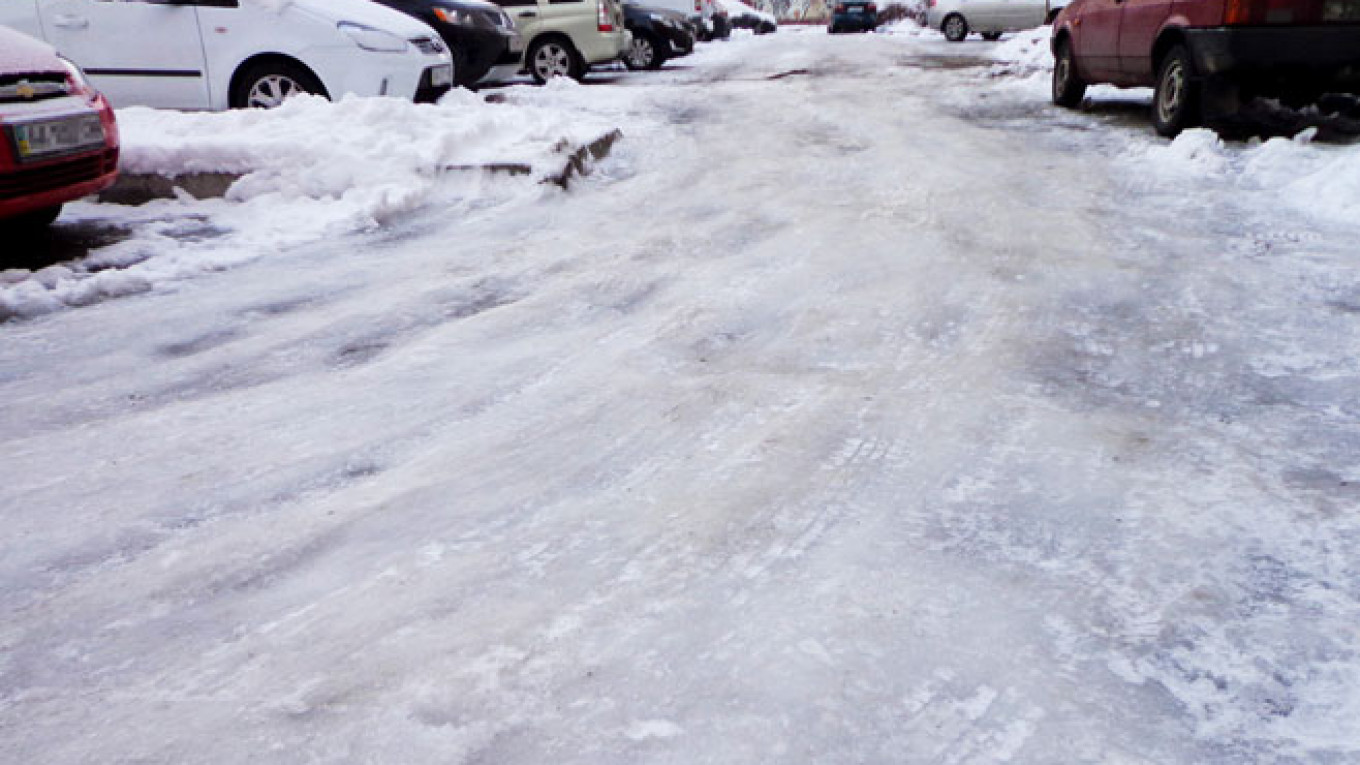
In Russian, appropriately enough, slipperiness is a slippery business.
For starters, it's hard to get a grip on how things get slippery in Russian. Let's say the weather is doing that Moscow thing — huge temperature fluctuations — and the ton of snow that was once a hard mass has turned to watery slush during the day. At night the temperature drops to just under freezing. You know what that means: a thin layer of ice on everything. But what's the right word: гололёд or гололедица?
Not that I will ever get this right if I'm not reading it from a dictionary, but here goes: гололёд is a layer of ice formed on tree branches, telephone wires, houses and windshields from drops of rain or sleet. Гололедица is the thin layer of ice that forms on a road or the kind of weather that produces it.
Got that? You say: Осторожно! На дорогах гололедица. (Watch out! The roads are icy.) Наступила гололедица (We've got icy weather.) But: Гололёд на высоковольтных линиях стал возникать чаще (We've had more ice on high-voltage wires lately.)
But even Russians get this wrong: На трассе Тверь-Бежецк стоит дорожный знак "Осторожно — гололёд!" (On the highway from Tver to Bezhetsk was a sign: Be Careful! Ice condensate!) So maybe forget about learning this distinction. In 10 years the dictionaries will list the words as synonyms, so why bother?
In any case, we've got ice. Скользко (It's slippery.) So when it's slippery, you slip — скользить, right?
Well, yes and no. In one context, скользить can mean to slip: Он наступает на лёд, скользит и падает (He steps onto the ice, slips and falls). But in ten other contexts the slipping is really sliding and gliding and moving effortlessly across a surface, like: cани скользят с горы (sleds slide down the hill) or карандаш скользит по бумаге (the pencil glides across the paper).
So what's the prefix that makes slipping unambiguously bad? Prefixes are my personal слабое место (weak spot), so I grab the dictionary.
Ускользнуть? Nope. This is slipping away, like a thief in the night: Он появился в ярком свете фонаря, но быстро ускользнул в тень (He appeared in the bright light of the streetlamp but quickly slipped off into the shadows.)
With соскользнуть we're getting closer. This verb can be used to describe something sliding off, like a ski or wheel or person: лыжи соскользнули с ног (the skis slipped off his foot); колеса соскользнули с рельсов (the wheels slipped off the tracks); она соскользнула со скамеечки (she slid off the bench). So you can use it to slip, but only if you are slippy-sliding down something: Рабочий соскользнул с мокрой крыши (The worker slid off the wet roof.)
So what do you call it when you slip on the ice, fly up in the air and then crash down? That doesn't involve obscenities? Well, there are two possible answers from Russians: подскользнуться and поскользнуться. Dictionaries only recognize the latter, but that apparently does not reflect real speech patterns. As one person asks: Что вы скажите о том, что полстраны произносит именно "подскользнуться"? (What do you say about the fact that half the country says the former?)
I say: Отлично! (Terrific!) Another case of "wait a decade and they'll be synonyms." Meanwhile if I slip up, I'll just say: Скользкий язык! (Slippery language.)
Michele A. Berdy, a Moscow-based translator and interpreter, is author of "The Russian Word's Worth" (Glas), a collection of her columns.
A Message from The Moscow Times:
Dear readers,
We are facing unprecedented challenges. Russia's Prosecutor General's Office has designated The Moscow Times as an "undesirable" organization, criminalizing our work and putting our staff at risk of prosecution. This follows our earlier unjust labeling as a "foreign agent."
These actions are direct attempts to silence independent journalism in Russia. The authorities claim our work "discredits the decisions of the Russian leadership." We see things differently: we strive to provide accurate, unbiased reporting on Russia.
We, the journalists of The Moscow Times, refuse to be silenced. But to continue our work, we need your help.
Your support, no matter how small, makes a world of difference. If you can, please support us monthly starting from just $2. It's quick to set up, and every contribution makes a significant impact.
By supporting The Moscow Times, you're defending open, independent journalism in the face of repression. Thank you for standing with us.
Remind me later.









